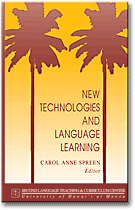Distribution of rare languages on the net. 
 During my research on the development of new technologies in ATTENDING, we discovered the existence of a book (in English): "New Technologies and Language Learning "," New technologies and language learning, which is a compilation of different programs to integrate new technologies in language teaching and particularly rare languages conducted by the University of Hwai. The book consists of various articles devoted, for example, distance education in a foreign language, the use of video in the classroom vertuelle language, creation of new software to enhance the dissemination of language and culture on the net, setting up specific programs for the less taught languages such as Arabic, Japanese, Korean, Mandarin or Russian.
During my research on the development of new technologies in ATTENDING, we discovered the existence of a book (in English): "New Technologies and Language Learning "," New technologies and language learning, which is a compilation of different programs to integrate new technologies in language teaching and particularly rare languages conducted by the University of Hwai. The book consists of various articles devoted, for example, distance education in a foreign language, the use of video in the classroom vertuelle language, creation of new software to enhance the dissemination of language and culture on the net, setting up specific programs for the less taught languages such as Arabic, Japanese, Korean, Mandarin or Russian.
This book is particularly interesting because it shows the potential wealth of distance learning of languages and a range of programs at once broad and original, its specificity is his interest in the less commonly taught languages. The University of Hawaii for the opening of forgotten languages diffision and that's what we spent to present this book.
All my wishes for prosperity for 2006
Abir

 During my research on the development of new technologies in ATTENDING, we discovered the existence of a book (in English): "New Technologies and Language Learning "," New technologies and language learning, which is a compilation of different programs to integrate new technologies in language teaching and particularly rare languages conducted by the University of Hwai. The book consists of various articles devoted, for example, distance education in a foreign language, the use of video in the classroom vertuelle language, creation of new software to enhance the dissemination of language and culture on the net, setting up specific programs for the less taught languages such as Arabic, Japanese, Korean, Mandarin or Russian.
During my research on the development of new technologies in ATTENDING, we discovered the existence of a book (in English): "New Technologies and Language Learning "," New technologies and language learning, which is a compilation of different programs to integrate new technologies in language teaching and particularly rare languages conducted by the University of Hwai. The book consists of various articles devoted, for example, distance education in a foreign language, the use of video in the classroom vertuelle language, creation of new software to enhance the dissemination of language and culture on the net, setting up specific programs for the less taught languages such as Arabic, Japanese, Korean, Mandarin or Russian. 


